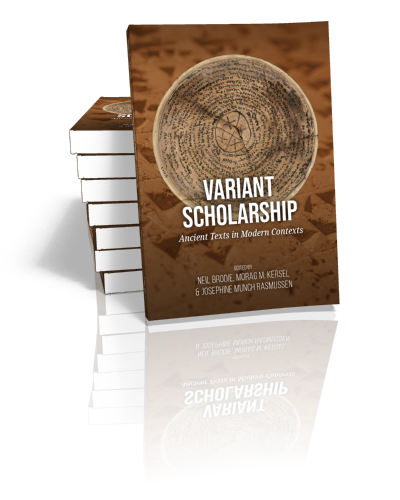Paperback ISBN: 9789464270457 | Hardback ISBN: 9789464270464 | Imprint: Sidestone Press Academics | Format: 173x253mm | 248 pp. | Language: English | 12 illus. (bw) | 7 illus. (fc) | Keywords: provenance; ancient texts; context; knowledge production; ethics; antiquities trade; authenticity; ancient and medieval manuscripts | download cover
Since the eighteenth century, many if not most ancient and medieval manuscripts or other text-bearing or associated objects have been procured through imperial expropriation or through the antiquities market with little or no evidence of findspot or place of original deposition and with no assurance of legal provenance or authenticity. The consequences of these questionable acquisition practices for scholarship and for our understanding of the past are the focus of much enquiry.
Recent high-profile acquisitions (and subsequent returns) of text-bearing objects by prominent private collectors and museums and the appearance on the market of demonstrably modern forgeries have resulted in increased scrutiny of the intellectual and commercial impacts of academic engagement. Scholarly research can abet the antiquities market directly or indirectly through identification, authentication and legitimation of illegally traded text-bearing objects.
These harmful complications of well-established academic practice raise important questions about how and even if the academy should engage with ancient texts and text-bearing objects of uncertain provenance. Through a wide-ranging set of case studies, Variant Scholarship focuses on the methodological, theoretical, and ethical dilemmas facing scholars when working with ancient texts in modern contexts.
This book is intended for those interested in the historical practices of research into ancient manuscripts, ethical quandaries in studying unprovenanced textual materials, and the unintended consequences of scholarly interactions with problematic text-bearing objects.
Variant scholarship: ancient texts in modern contexts
Neil Brodie, Morag M. Kersel, and Josephine Munch RasmussenDisciplinary pitfalls: how good philology can mask bad provenance
Nils H. KorsvollThe provenance of the Dead Sea Scrolls: five examples
Årstein JustnesPerforming papyrology: cartonnage, discovery and provenance
Roberta MazzaThe Ilves Collection: a Finnish manuscript collector and the academic facilitators
Rick BonnieNoxious scholarship? The study and publication of First Sealand Dynasty cuneiform tablets
Neil BrodieConsuming Palmyra
Michael PressEthical guidelines for publishing ancient texts
Patty GerstenblithThe trouble with texts
Morag M. KerselThe value of forgeries for historical research
Christa Wirth and Josephine M. RasmussenSomeone else’s manuscripts: the ethics of textual scholarship
Liv Ingeborg LiedBetween representation and the real: the forgeries of Constantine Simonides
Rachel Yuen-CollingridgeProvenance: genocide. The transfer of Armenian sacred objects to art collections
Heghnar Zeitlian WatenpaughDigitizing manuscripts and the politics of extraction
Raha Rafii

No comments:
Post a Comment